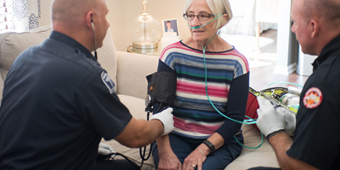- Cardiology And Vascular Health
- Health Topics
- Heart And Vascular Disease Prevention
- Heart Health
- Stroke
- Stroke And Other Vascular Diseases
- Stroke Prevention
Keep the Beat And Prevent Strokes

Answer a few questions and we'll provide you with a list of primary care providers that best fit your needs.
A fluttering in your heart or a rapid, irregular heartbeat could be a sign of arrhythmia, or abnormal heart rhythm.
Often, abnormal heartbeats cause no harm. But the most common type of abnormal heart rhythm, atrial fibrillation (AFib), is considered a major risk factor for stroke. And the American Heart Association reports that stroke is the leading cause of preventable disability.
The good news: Your physician or health care provider can assess your degree of stroke risk from AFib, says neurologist Esteban Cheng-Ching, MD. And your physician can help you lower the risk.
“Atrial fibrillation can increase your risk of stroke fivefold, and one-third of AFib patients actually have a stroke,” Dr. Ching said.
“Physicians use different tools to assess stroke risk in AFib patients that factor in contributing risks such as high blood pressure, high cholesterol, diabetes, obesity, and smoking,” Dr. Ching says.
How Does A Fib Raise Stroke Risk?
Mark Krebs, MD, explains that AFib’s irregular rhythm alters blood flow through the heart’s upper chambers, the atria. Blood pools in the corners of the atria, specifically the left atrial appendage, a small pouch that empties into the left atrium, where it can form clots. These clots can dislodge from the heart and travel to other parts of the body.
Dr. Krebs talks about how atrial fibrillation increases the risk of stroke.
Click play to watch the video or read video transcript.
As about half of blood flow from the heart goes to the head and brain, stroke is a major consequence of AFib-related clots, Dr. Krebs explains. These clots block blood and oxygen from the brain.
When Should You See Your Doctor?
Dr. Ching advises that symptoms of AFib may include significant palpitations, light-headedness, chest pain, fatigue, or shortness of breath. “Any symptoms should prompt a visit with your primary care physician, who can conduct a screening for the symptoms and tests — such as an EKG or a Holter monitor — to check heart rhythm.”
Patients with other risk factors such as high blood pressure, diabetes, high cholesterol, smoking, and obesity are at higher risk of developing AFib and should be tested more often, he adds.
Treatment Options For Lowering Stroke Risk
If your AFib-related stroke risk is high, your doctor has treatment options to choose from to lower the risk, based on your diagnosis.
These include a variety of blood-thinning medications, or anticoagulants, which prevent formation of blood clots.
Dr. Ching said, “Several new blood thinners have been approved by the FDA in recent years, so there are more options now for patients. Some of these medications don’t require as much blood monitoring and lab monitoring as previous medications.”
Your doctor or health care provider may also prescribe medications to treat the AFib and return your heart to a normal rhythm, and other medicines to slow the heartbeat. In some cases, surgical procedures may be used to bring the heart back to normal rhythm.
Another option to reduce the risk of stroke is the WATCHMAN™ Left Atrial Appendage (LAA) Closure Device. In patients with AFib, it’s believed that most clots that cause stroke originate in the heart’s left atrial appendage. The WATCHMAN™ Device closes off the appendage to prevent harmful blood clots from entering the bloodstream and potentially causing a stroke. Over time, patients with the device may be able to stop taking the blood thinner warfarin.
The Risks of Not Treating AFib
Untreated, AFib can lead to strokes that can be fatal or disabling. “Atrial fibrillation can increase your risk of stroke fivefold, and one-third of AFib patients actually have a stroke,” Dr. Ching said. “This increases if you have other risk factors such as high blood pressure, smoking, obesity, and high cholesterol.”
Answer a few questions and we'll provide you with a list of primary care providers that best fit your needs.
Source: Centers for Disease Control; Esteban Cheng-Ching, MD, Clinical Neuroscience Institute; Mark Krebs, MD, Miami Valley Cardiologists; American Stroke Association; American Heart Association






